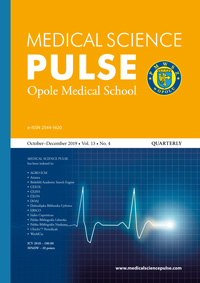Preterm birth and perinatal outcome: an observational cohort study
Preterm birth and perinatal outcome: an observational cohort study
Author(s): Naina Kumar, Ashu YadavSubject(s): Health and medicine and law
Published by: Państwowa Medyczna Wyższa Szkoła Zawodowa w Opolu
Keywords: pregnancy; infant; newborn; intensive care units
Summary/Abstract: Background: Preterm birth is a common cause for neonatal morbidity and mortality worldwide. Aim of the study: To compare perinatal outcomes in preterm and term neonates. Material and methods: The present cohort study was conducted in the Obstetrics and Gynecology Department of MMIMSR, Ambala, a rural tertiary care center of Northern India over a one-year period (January-December 2018). 2,997 antenatal women were recruited at gestation (≥28 weeks) with singleton live pregnancies. All participants were divided into two groups: Group I: Antenatal women delivering at gestation (≥37 weeks) and Group II: Antenatal women delivering at gestation (≥28 to <37-weeks. Onset of labor, mode of delivery, perinatal outcome including birth weight, Apgar scores, Neonatal Intensive Care Unit (NICU) admission, need for intubation, complications, and mortality were compared between groups. Results: Of 2,997 deliveries, 2,528 (84.4%) were full-term, 469 (15.6%) preterm [48(10.2%) very preterm and 421(89.8%) late preterm] deliveries. The most common mode of delivery in both full-term and preterm participants was spontaneous vaginal delivery (62.8% vs 60.4%) followed by cesarean section (36.6% vs 39.2%). Preterm neonates (especially very preterm) had significantly lower birthweights (p<0.001, OR: 0.898; 95% CI: 0.108-7.48), 1-minute (p=0.018; OR: 7.812; 95% CI: 1.06-57.69) and 5-minutes Apgar scores (p=.000; OR: 3.410; 95% CI: 1.79-6.48) as compared to moderate- to- late preterm neonates. NICU admission rate, need for intubation, neonatal complications, stillbirth and early neonatal deaths were significantly higher in preterm neonates (p=.000). The most common complication in preterm neonates was Respiratory Distress Syndrome 172(55.1%) followed by sepsis 41(54.7%). Conclusions: Preterm delivery, especially very preterm, was significantly associated with adverse perinatal outcome as compared to full-term delivery.
Journal: Medical Science Pulse
- Issue Year: 13/2019
- Issue No: 4
- Page Range: 4-10
- Page Count: 7
- Language: English

